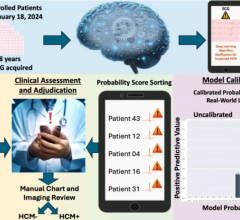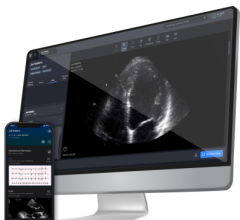
A nurse examines a patient in the Emergency Department of Cincinnati Children’s, where researchers successfully tested artificial intelligence-based technology to improve patient recruitment for clinical trials. Researchers report test results in the journal JMIR Medical Informatics. Image courtesy of Cincinnati Children’s.
July 31, 2019 — Clinical trials are a critical tool for getting new treatments to people who need them, but research shows that difficulty finding the right volunteer subjects can undermine the effectiveness of these studies. Researchers at Cincinnati Children’s Hospital Medical Center designed and tested a new computerized solution that used artificial intelligence (AI) to effectively identify eligible subjects from electronic health records (EHRs), allowing busy clinical staff to focus their limited time on evaluating the highest quality candidates.
The study is published online in JMIR Medical Informatics.1 It shows that compared to manually screening EHRs to identify study candidates, the system — called the Automated Clinical Trial Eligibility Screener (ACTES) — reduced patient screening time by 34 percent and improved patient enrollment by 11.1 percent. The system also improved the number of patients screened by 14.7 percent and those approached by 11.1 percent.
Busy emergency departments often serve as excellent locations for clinical trial coordinators to find people who may be good study candidates. According to the study’s lead investigator, Yizhao Ni, Ph.D., Division of Biomedical Informatics, ACTES is designed to streamline what often proves to be inefficient clinical trial recruiting process that does not always catch enough qualified candidates.
“Because of the large volume of data documented in EHRs, the recruiting processes used now to find relevant information are very labor intensive within the short time frame needed,” said Ni. “By leveraging natural language processing and machine learning technologies, ACTES was able to quickly analyze different types of data and automatically determine patients’ suitability for clinical trials.”
How it Works
The system has natural language processing, which allows computers to understand and interpret human language as the system analyzes large amounts of linguistic data. Machine learning allows computerized systems to automatically learn and evolve from experience without specifically being programmed. This makes it possible for computer programs to process data, extract information and generate knowledge independently.
The automated system extracts structured information such as patient demographics and clinical assessments from EHRs. It also identifies unstructured information from clinical notes, including the patients’ clinical conditions, symptoms, treatments and so forth. The extracted information is then matched with eligibility requirements to determine a subject’s suitability for a specific clinical trial.
The system’s machine learning component also allows it to learn from historical enrollments to improve its future recommendations, according to the researchers. Much of the analyses are handled by carefully designed AI algorithms, essentially procedures or formulas that computers use to solve problems by performing a set sequence of specified actions.
Advanced to Live Clinical Setting
Previously the system was successfully pilot tested in a retrospective study published in 2015 by the Journal of the American Medical Informatics Association.2 The current study tested the solution prospectively and in real time in a busy emergency department environment, where clinical research coordinators recruited patients for six different pediatric clinical trials involving different diseases.
Using the technology in a live clinical environment involved significant collaboration between data scientists, application developers, information service technicians and the end users — clinical staff.
“Thanks to the institution’s collaborative environment, we successfully incorporated different groups of experts in designing the integration process of this AI solution.” Ni said.
The researchers listed as limitations the small number of clinical trials used in the study, all from a single clinical department. They also pointed to some lingering issues involving the system’s accuracy at interpreting data. These issues will be resolved in future studies through ongoing enhancements to the technologies and also by testing the system in a wider variety of clinical departments, according to the investigators.
For more information: www.medinform.jmir.org
References
1. Ni Y., Bermudez M., Kennebeck S., et al. A Real-Time Automated Patient Screening System for Clinical Trials Eligibility in an Emergency Department: Design and Evaluation. JMIR Medical Informatics, July 24, 2019. DOI: 10.2196/14185
2. Ni Y., Kennebeck S., Dexheimer J.W., et al. Automated clinical trial eligibility prescreening: increasing the efficiency of patient identification for clinical trials in the emergency department. Journal of the American Medical Informatics Association, published online July 16, 2014. https://doi.org/10.1136/amiajnl-2014-002887


 September 24, 2025
September 24, 2025 









